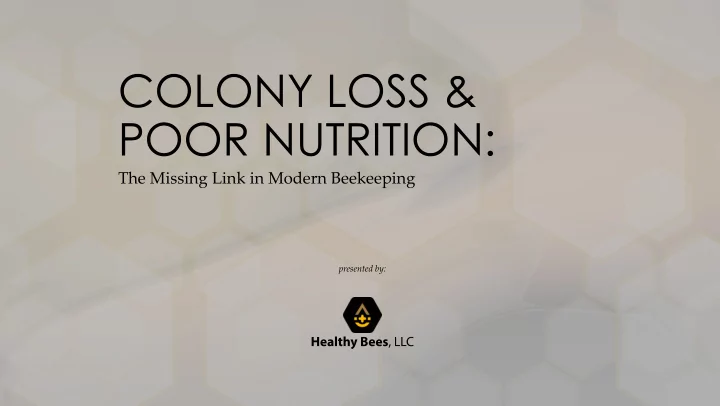

COLONY LOSS & POOR NUTRITION: The Missing Link in Modern Beekeeping presented by:
Beekeepers in the U.S. are reportedly experiencing average annual losses of 40%
The Reasons Behind The Losses: I. Pesticides II. Varroa III. Lack of Natural Forage IV. Nosema
The common link between them all: Poor Nutrition
A Real World Example Three men board a plane. The 1 st guy eats only Burger King, KFC, and Baskin Robbins. The 2 nd guy eats at health food stores and consumes a balanced diet of fruits, vegetables, and lean proteins. The 3 rd guy (who sits between them) has the flu. Unhealthy, Fast Healthy, Sick Passenger Food Diet Balanced Diet Which of them is most likely to walk off that plane with the flu, too?
I. Pesticide Exposure & Poor Nutrition When simultaneously exposed to poor nutrition and pesticide exposure, scientists at University of California at San Diego found that bee deaths increased by up to 50% more than expected compared to the individual effects of poor nutrition and pesticide exposure.
II. Varroa & Poor Nutrition Varroa parasitism inherently damages bees and their development. Balanced nutrition can lessen the damage caused by Varroa. Viruses transmitted by Varroa are taxing, and the nutritional cost of immune response is high. Balanced nutrition helps bees fight viral infections.
III. Lack of Natural Forage & Poor Nutrition Natural disasters, inclement weather, increased monocultures, declining wild spaces, and overuse of herbicides have reduced the amount of natural forage available to honey bees. Without proper nutrition, bees will continue to struggle to fill their nutritional requirements brought on by a growing lack of forage.
IV. Nosema & Poor Nutrition 1. While the nosema/nutrients interaction is varied, research shows that quality protein extends a bee’s life during an infection. 2. Poor nutrition promotes the use of antibiotics, which can weaken honey bee gut health. 3. Overuse of antibiotics can lead to antibiotic-resistant strains of nosema. Poor nutrition allows nosema to thrive
Beekeeping Practices & Poor Nutrition Traditional beekeepers feed their bees sugar and protein. Until now, most proteins were made of GMO soy which contains sugars such has stachyose (a sugar indigestible by bees), as well as promotes the overuse of herbicides deleterious to bee health. Feeding only sugar provides zero micronutrients to your bees and, if stored improperly, may actually poison your bees. Many protein sources have inefficient amino acid ratios or lack essential amino acids. GMOs encourage Roundup use which hurts honey bee gut health.
Why Balanced Nutrition is Needed All Year Long 1. Bees need quality protein to properly develop, mainly from an egg until their 15 th day. Poor protein intake can cause developmental issues. 2. Forage quantity and quality can be unpredictable – bees need access to balanced nutrition all year in order to maintain their health. 3. Balanced nutrition leads to healthy bees, and healthy bees pollinate more crops and produce more honey. 4. When fed balanced nutrition all year long, bees are better equipped to fight off pesticides, viruses, mites, and diseases on their own .
Moral of the Study Balanced nutrition is the only way.
About Healthy Bees™ Healthy Bees™ is an all -natural balanced nutritional supplement for honey bees
Thank You! www.healthybeesllc.com +1 (786) 524-9200 info@healthybeesllc.com Come see us at our booth!
Recommend
More recommend